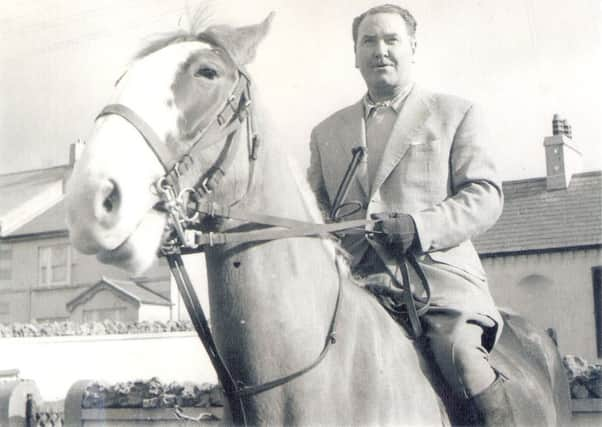Unlocking the myths of legendary Irish tenor on centenary of his birth


Locke often ended his shows with the stirring anthem, to rapturous applause and standing ovations.
“…as the bonfire keeps on burning,
Happy days will be returning,
While the band keeps playing
We’ll let our troubles blaze away.”
Northern Ireland’s legendary tenor appeared in variety shows with the top names in the business - George Formby, Julie Andrews, Morecambe and Wise, Shirley Bassey and Tommy Trinder, mentioning but a few.
A full list would swamp this page!
Advertisement
Hide AdAdvertisement
Hide AdFreshly arrived from the city where Locke was popularly regarded as Mr Blackpool, an enthralling exhibition opens in Belfast today marking ongoing celebrations of the centenary of his birth in Londonderry on 23 March 1917.
Between 1945 and 1955 Josef topped the bill for an impressive total of eight, full Blackpool summer-seasons, an extensive and lucrative limelight that dimmed considerably when he absconded to Ireland from his enormous, unpaid tax-bill.
In later years he claimed that he owed £40,000 - a fortune in those days.
The bill was in fact a little over £17,000, though that was still an awesome debt in the late 1950s.
Advertisement
Hide AdAdvertisement
Hide AdContrasting reports about his arrears are amongst the many myths about the larger-than-life superstar with a larger-than-life voice.
When he died aged 82 in 1999 a newspaper obituary recalled - “though his career was certainly rags to riches, it was also as fraught with trouble and controversy as the most compelling soap opera.”
Until the end of May Belfast’s Linen Hall Library is hosting the largest collection ever assembled of public and private documents, artefacts and memorabilia drawn from Josef Locke’s hugely-colourful, 50-year-career, with an illustrated lunchtime talk today entitled ‘Myths and Realities’ by author and biographer Dr Nuala McAllister Hart.
Much of the displayed material hasn’t been seen by the public before, and some items were only discovered recently in the attic of a house in County Donegal that Locke once owned.
Advertisement
Hide AdAdvertisement
Hide AdThe main photograph on Roamer’s page today has never been published and is here by permission of the McLaughlin/Locke family.
In Dr Hart’s entrance-free lunchtime lecture at 1.00pm today the historical musicologist, pianist and former University lecturer explores the numerous myths surrounding the singer, soldier, father, policeman, farmer, family man, accomplished horseman… and local, national and international celebrity.
He was also a publican, hotelier, gambler, drinker, race-horse owner and friend of writer Brendan Behan and politician Charlie Haughey
“He had a phenomenal life and career,” Nuala told me.
Shortly after the iconic singer died, former Enniskillen railwayman Harold McIntyre reminisced about Locke arriving on the station platform in 1939 “with a large luggage chest that he had in the army with Constable McLaughlin written on it.”
Advertisement
Hide AdAdvertisement
Hide AdJoseph McLaughlin was born at 19 Creggan Street, Londonderry, on 23 March 1917, son of Patrick, a butcher and cattle dealer, and Annie Francis, a shirt-factory machinist.
Joseph joined the Irish Guards in 1934 and after serving in Egypt and Palestine went to Enniskillen R.U.C. Training Depot as an instructor (Constable number 5349) in 1939.
At the end of the year on 12 December he performed his first programmed concert in the local Foresters Hall. After a short posting in Lisburn he moved to Belfast in 1941.
Nuala McAllister Hart’s book and today’s lunchtime lecture recount his years in Belfast as both policemen and singer, his name-change and path to showbiz, and how “his rise to fame started in a Belfast Theatre - and not Dublin’s Gaiety Theatre, as many believe.”
Advertisement
Hide AdAdvertisement
Hide AdNuala will un-Locke some popular myths, mysteries and rarely recounted chronicles, such as “the concert in London’s Royal Albert Hall in March 1970 with David Bowie as his support act, and what happened between the two men.”
On the same day in 1958 that the Inland Revenue tipped him into the Blackpool Bankruptcy Court he fled to Ireland.
He returned in 1968, settled his financial affairs and embarked on another gruelling season of variety shows.
Waiting for Locke in his Queen’s Theatre dressing room were a number of telegrams from showbiz colleagues, including Ken Dodd, welcoming him back to Blackpool.
Advertisement
Hide AdAdvertisement
Hide AdSeven of the original greetings were discovered recently in a Donegal attic.
They’re part of the Linen Hall exhibition, including a spoof, allegedly from the Inspector of Taxes!
“Welcome back,” says the revenue-man, wishing Locke “great success.”!
He sang to Princess Diana. He appeared in This is Your Life. He appeared in two Royal Command performances.
Advertisement
Hide AdAdvertisement
Hide AdHe was the first entertainer in Britain to earn £1,000 a week in the later 1940s, a fortune which (it is said!) he managed to dispose of just as quickly.
His records outsold Frank Sinatra and Bing Crosby in the UK in the 1950s and when retirement beckoned he held lucrative farewell concerts - frequently! Full information about the Linen Hall free exhibition and lunchtime lecture is at www.linenhall.com and to purchase Nuala McAllister Hart’s book see Josef Locke The People’s Tenor on Facebook.